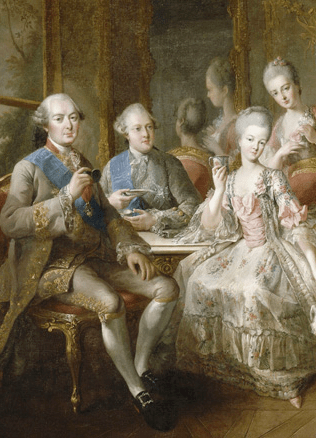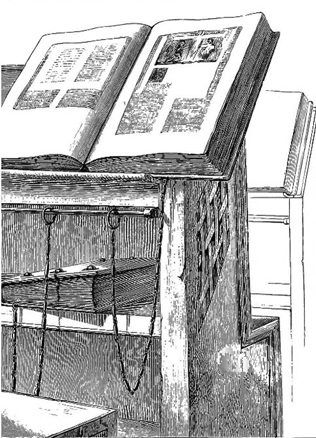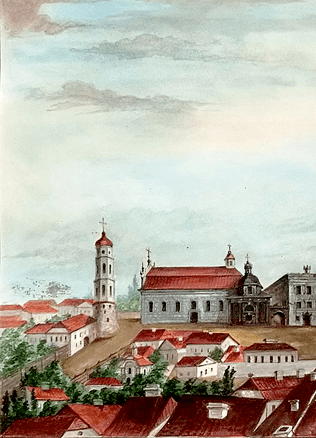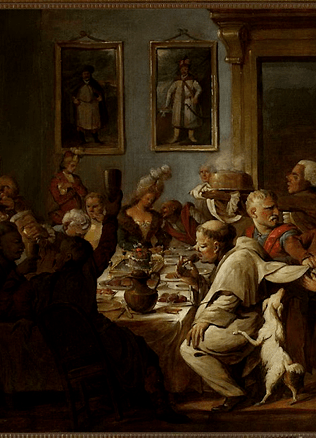Michał Franciszek Karpowicz – “the Prince of Preachers”
Michał Franciszek Karpowicz is one of the most eminent preachers of the 18th century. Due to exceptional eloquence he was nicknamed the “Prince of Polish Preachers.”
The silver tongue warranted medals and threats of exile
Bishop Karpowicz was born on 4 October, 1744, in Kamyenyets, Lithuanian Brest Province, in a family of minor gentry (szlachta). From 1757 to 1761, he studied in Brest Jesuit College and later pursued studies in Warsaw Missionary Seminary. As a cleric, a would-be bishop gained fame for being a talented orator, and was granted the right to deliver sermons in church of St. Cross, Warsaw, even prior to his ordination as a priest. Upon completion of his clerical studies, Karpowicz taught philosophy in Warsaw seminary and served as a preacher in St. John’s College. He also held the position of professor of theology in the Missionary Seminary of Krakow and taught theology and Holy Scripture in Vilnius Seminary. In 1774, Michał Franciszek Karpowicz was delegated to the Missionary Convent held in Warsaw. After a conflict with his superiors, he moved to Lithuania. Having settled here, he served as a parish priest in Prienai and Gražiškės. He was also archdeacon of Smolensk and canon of Poznan.
In 1778, Michał Franciszek Karpowicz was awarded the medal Merentibus (medal of merit) by Stanislaus Augustus, and in 1792 he received the St. Stanislaus Order of merit. The ruler Stanislaus Augustus called him “the centrepiece of our age.”
After the suppression of the uprising, upon the Order of Lithuanian Governor-General Nikolai Vasilyevich Repnin, Michał Franciszek Karpowicz was dismissed from his teaching position as a professor. He withdrew to Prussia. In 1796 he delivered a speech in Gumbinnen, greatly appreciated by Friedrich Wilhelm III, King of Prussia. The following year, Karpowicz was appointed governor of the newly established Diocese of Wigry. He died on 5 November, 1803, in Berżniki near Sejny. In the sermon delivered by Livonian Canon Theodore Mietelski in Wygri Cathedral during Michał Franciszek Karpowicz’s funeral ceremony, the following message was highlighted: the prominent missionary succeeded in finding “reconciliation of faith and reason, as well as reconciliation of Religion and Philosophy.” These words are presumably the very quintessence of this great personality.
The inciter of the social and historical conscience
Michał Franciszek Karpowicz’s talent as a celebrated preacher blossomed in the year 1776, the so-called “jubilee year.” Expressing obedience to Pope Pius VI, Vilnius Bishop Ignacy Jakob Massalski announced the celebration of the anniversary of a quarter of a century. The ceremony was due to start on July 6, 1776 and last up until 29 of December. Sermons had to be delivered in the four churches of Vilnius: St. John’s, St. Casimir, St. Francis and St. Bernard, and the Church of the Holy Spirit. In total, 130 sermons were planned to be delivered in Vilnius. To implement Massalski’s ambitions, two members of Missionary Congregation were chosen: professors of the Vilnius Seminary Wilhelm Kalinski and Michał Franciszek Karpowicz. According to the Bishop of Vilnius, the first professor was “nice and playful,” whereas the other was “trustworthy and able to conduct serious work.” It is not in vain that Massalski said the following: “Karpowicz’s sermons are meant to be listened to, whereas Kalinskis’ sermons should be read.” Out of all the sermons preached during the “jubilee year,” special focus was placed on the cultural and social aspects of this programme. In the 10 sermons told by Michał Franciszek Karpowicz, the following themes were explored: education of women and children, the benefit of universal education, parish schools, relationship between landowners and peasants, abuse by landowners, responsibilities of the gentry, assemblies, superstitions, alcohol addiction, idleness, pilferage, repair of roads and bridges, begging, taking alms, diseases and their treatment. These sermons were apotheosis of labour, rights and education. They received a strong response among the Vilnans of that time and therefore their individual prints were released in 1776.
Michał Franciszek Karpowicz also focused on patriotic education, highlighting in his sermons the love for Motherland.
In 1781, at the opening session of Lithuanian Tribunal, he delivered a sermon On the Love for Motherland. In the sermon, the preacher said the following: “If we [ourselves] were tested, what feelings would the remembrance of the virtues of our ancestors, the founders of freedom and glory, arise in us? We should cherish the memories of the battle-seasoned Poles, whose blood marked the borders of the State. We should nurture the memories of Algirdas, conqueror of Rus, and Vytautas, who won a victory against Tartars. Isn’t it great to reminisce about the heroic deeds and campaigns performed by the Jagiellonian dynasty in their Lithuania, or take pride in remembering how much foreign rulers sought to pursue alliance with the Jagiellonians? We should never forget that Vytautas crowned tsars and Tatar Khans in Vilnius and granted them powers. In that glorious past, each contemporary descendant of these celebrated dynasties can find the honourable names of their ancestors. What feelings do the deeds of the glorious past arise in the hearts of our citizens today?”
Eligijus Raila



